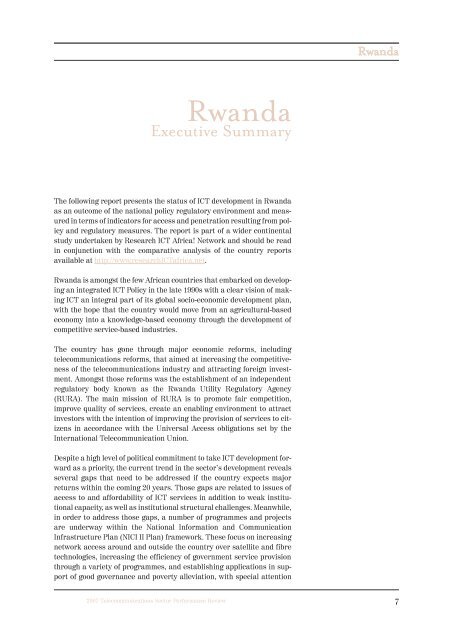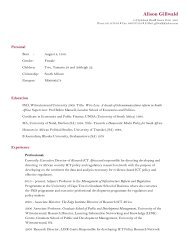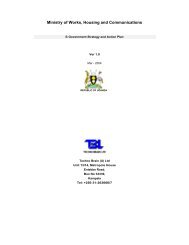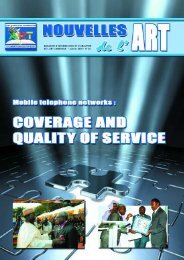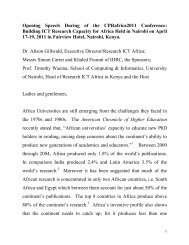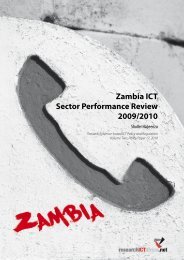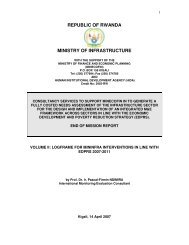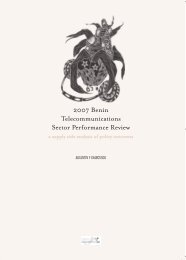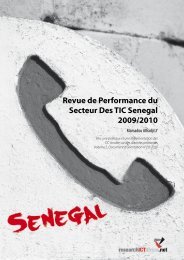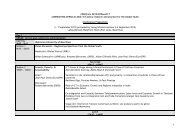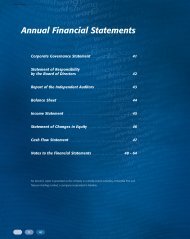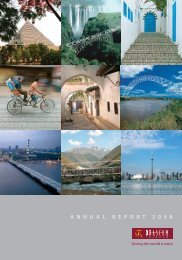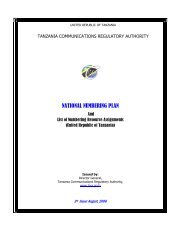Rwanda Telecommunications Sector Performance Review 2007
Rwanda Telecommunications Sector Performance Review 2007
Rwanda Telecommunications Sector Performance Review 2007
Create successful ePaper yourself
Turn your PDF publications into a flip-book with our unique Google optimized e-Paper software.
<strong>Rwanda</strong><br />
<strong>Rwanda</strong><br />
Executive Summary<br />
The following report presents the status of ICT development in <strong>Rwanda</strong><br />
as an outcome of the national policy regulatory environment and measured<br />
in terms of indicators for access and penetration resulting from policy<br />
and regulatory measures. The report is part of a wider continental<br />
study undertaken by Research ICT Africa! Network and should be read<br />
in conjunction with the comparative analysis of the country reports<br />
available at http://www.researchICTafrica.net.<br />
<strong>Rwanda</strong> is amongst the few African countries that embarked on developing<br />
an integrated ICT Policy in the late 1990s with a clear vision of making<br />
ICT an integral part of its global socio-economic development plan,<br />
with the hope that the country would move from an agricultural-based<br />
economy into a knowledge-based economy through the development of<br />
competitive service-based industries.<br />
The country has gone through major economic reforms, including<br />
telecommunications reforms, that aimed at increasing the competitiveness<br />
of the telecommunications industry and attracting foreign investment.<br />
Amongst those reforms was the establishment of an independent<br />
regulatory body known as the <strong>Rwanda</strong> Utility Regulatory Agency<br />
(RURA). The main mission of RURA is to promote fair competition,<br />
improve quality of services, create an enabling environment to attract<br />
investors with the intention of improving the provision of services to citizens<br />
in accordance with the Universal Access obligations set by the<br />
International Telecommunication Union.<br />
Despite a high level of political commitment to take ICT development forward<br />
as a priority, the current trend in the sector’s development reveals<br />
several gaps that need to be addressed if the country expects major<br />
returns within the coming 20 years. Those gaps are related to issues of<br />
access to and affordability of ICT services in addition to weak institutional<br />
capacity, as well as institutional structural challenges. Meanwhile,<br />
in order to address those gaps, a number of programmes and projects<br />
are underway within the National Information and Communication<br />
Infrastructure Plan (NICI II Plan) framework. These focus on increasing<br />
network access around and outside the country over satellite and fibre<br />
technologies, increasing the efficiency of government service provision<br />
through a variety of programmes, and establishing applications in support<br />
of good governance and poverty alleviation, with special attention<br />
<strong>2007</strong> <strong>Telecommunications</strong> <strong>Sector</strong> <strong>Performance</strong> <strong>Review</strong><br />
7


